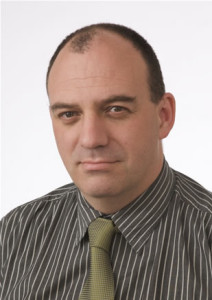Q&A – Deputy leader candidate Andrew Cooper: “We should have a referendum on the terms of Brexit”
In the latest of Bright Green’s coverage of the Green Party of England and Wales’ leadership election, we’ve interviewed the Deputy Leadership candidates.
Voting is now open (check your inbox for an email from Electoral Reform Services if you haven’t voted yet!) and closes on the 25th August.
Daniella Radice did not respond by the extended deadline, but if/when she responds we will publish her answers.
(Full Q&As with the leadership candidates are here)
Here’s Deputy Leadership candidate Andrew Cooper:
1. Why are you running?
I’m standing because I believe someone from the North, who is an experienced elected Green politician and who has actually successfully initiated many Green policies at the local level would be a strong addition to our Leadership Team.
2. Could you give some info on your background? (E.g. education, class, employment etc.)
I was born in Barnsley, raised in Huddersfield, and went to the local Comprehensive school gained a BA (Hons) Degree in Politics and International relations at Staffordshire Polytechnic. I have worked in the energy efficiency sector for over 20 years before becoming a Regional Campaigns Coordinator for the Green Party last year. I was first elected to Kirklees Council in 1999 and have been re-elected 6 times.
3. What are your top priorities as Deputy Leader if elected?
Supporting Local Parties to win elections at all levels of Government is important to convey our ideas and to put them into practice. We need to value the people who work on the ground to make our Target to Win Strategy a reality. We also need to celebrate good practice and electoral success much more in the Party to build a culture of contesting elections professionally and to’ demonstrate that we can win to a wider proportion of the electorate.
Giving a voice to our Regions
The Party needs a perspective in the Leadership Team that can speak with experience and authority from outside London and the South East. As a Councillor from Yorkshire with 17 years I feel well placed to fulfil that role.
Involving members
We should also ensure we involve our Party bodies and members in strategic decisions as much as possible. The Green Party needs to avoid situations where our position on key issues are perceived to be made by pronouncement.
Widening our reach.
The Green Party’s support is largely white and middle class. There are some good examples around the UK where that stereotype is challenged due to dedicated work by local Parties but we need to do more and get more BME candidates in our winnable Council seats.
Working with others to address Climate Change
Developing workable plans and policies to address climate change should be a top priority for the Green Party. As Deputy Leader I would forge stronger relations with NGOs and businesses that share our objectives to build our credibility and provide a robust challenge to Government and other Parliamentary parties on practical action to achieve the Paris Climate targets and beyond.
‘Progressive Alliances’
To be successful a Progressive Alliance will to be about more than being simply achieving Electoral Reform. If it is to have wide appeal we will need to demonstrate that Green policies can provide jobs, tackle climate change address poverty and provide secure and affordable homes.
4. How do you see the Greens relating to the Labour Party and the wider left?
I can see both the opportunities and the very real challenges with pursuing a Progressive Alliance with Labour and other parties of the left. One significant problem is that Labour itself is not yet a Party that believes in electoral reform. That is a big obstacle. Labour also has to resolve its own issues before it can start to think about how it might relate to others. Politics is in flux and we don’t know where all the pieces are going to land.
5. How should the party respond to Brexit? What, if anything, should we be calling for now?
I believe we should have a second referendum on the terms of Brexit then decide whether we pursue leaving the EU or not. I’m in favour of EU membership but recognise the very real issues of addressing the strong corporate and trade agendas.
6. What separates you from the other candidates?
I guess I’m older and more Northern but it’s the real experience as a local Councillor in a large Metropolitan Council that is my USP.
7. If elected, would this be your full-time job?
I would stand down from my position as a Regional Campaigns Coordinator if elected but remain as a Councillor. Deputy Leader would be a full time role for me.




Leave a Reply